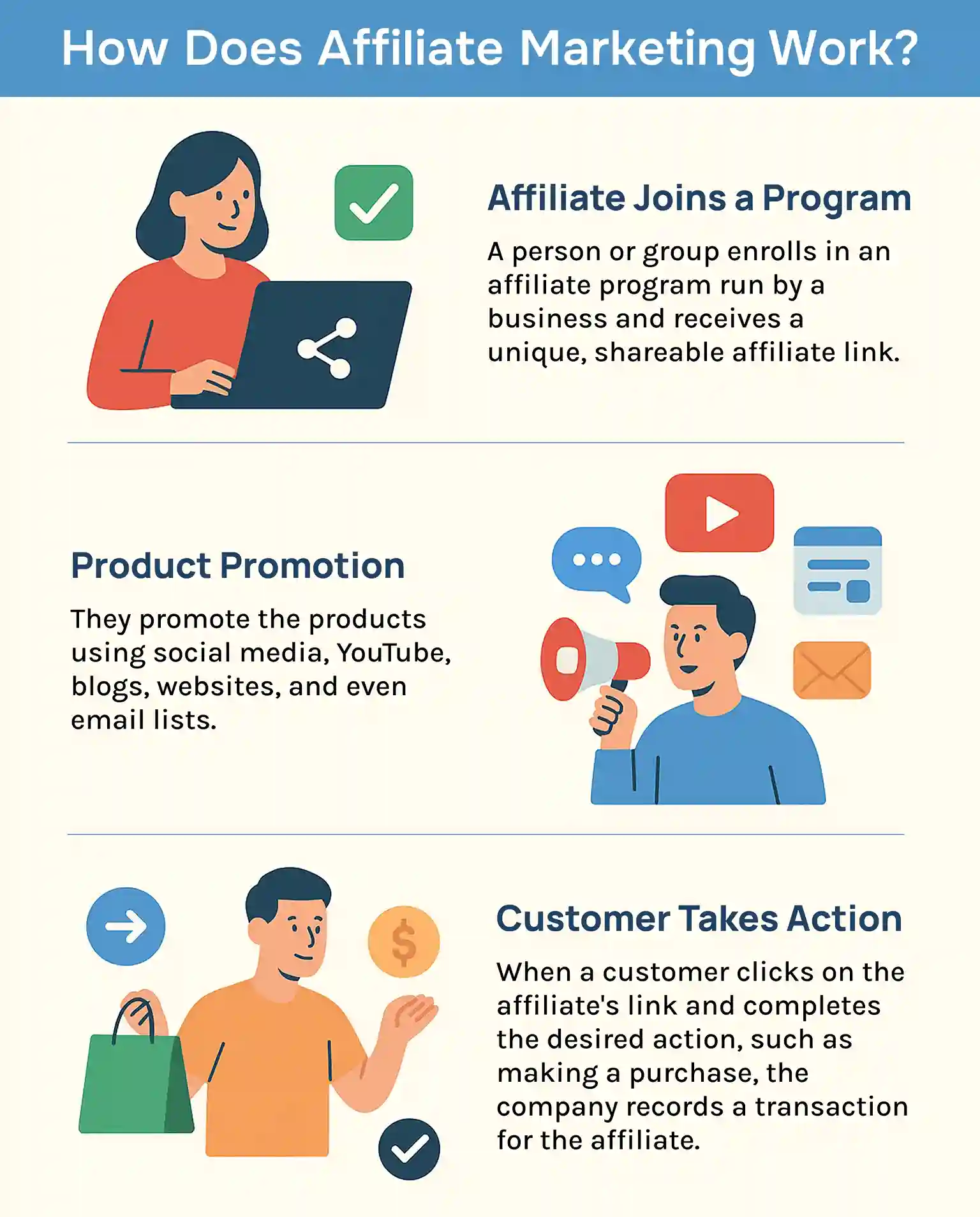If you’re here, you might be among those who know that there’s a difference between network marketing and affiliate marketing but aren’t sure what it is.
Well, don’t worry! We have covered every aspect of network marketing vs affiliate marketing that will help you understand the distinctions between the two.
Whether you’re evaluating both as your next business model or want to join one of the two, this blog will make every difference crystal clear. Therefore, you can make the right decision confidently!
This Article Contains:
What is Network Marketing?
Network marketing is a way of doing business where products or services are sold directly to customers, not through retail stores, but by independent distributors. Instead of spending millions on advertising or shelf space, companies rely on people to spread the word, share their experiences, and build customer bases. Fundamentally, this business model focuses on rewarding the distributors for selling products directly.
Types of Network Marketing
It consists of three main structures, or “tiers”:
1. Single-Tier
This is the most straightforward form of network marketing. Distributors sell a product or service, and they get paid a commission. A distributor purchases the products/services at a discounted price from the MLM company and sells them at the retail price, keeping the profit. That’s it. There’s no recruiting, no downline, and no second layer of income. You can think of it as direct selling in its purest form; your distributors earn only from their personal sales.
2. Two-Tier
Here, distributors not only earn from their personal sales but also from the sales made by people they personally recruit, known as direct recruits. This structure adds a second stream of income, since distributors get a commission on the sales generated by direct recruits. And many MLM companies pay bonuses for helping expand the sales force.
3. Multi-Level Marketing (MLM)
This tier is used to expand the network marketing business rapidly, as it allows distributors to recruit deeper downlines. In MLM, commissions are earned from distributors’ own sales, their direct recruits, and also from the recruits of direct recruits, and so on.
A few prominent companies using the network marketing business model are:
Amway
Herbalife
MaryKay
Scentsy
Forever Living
What is Affiliate Marketing?
Affiliate marketing is a marketing model or strategy that uses a network of independent affiliates to sell products. A brand can have both individuals and organisations as affiliates. Businesses compensate these people or groups (referred to as affiliates) for bringing customers, leads, or sales to their goods and services.
Businesses only pay them when a specific action is completed, like a sale being made, a form being filled out, or a subscription being started. Therefore, it’s a performance-based model: if no results are delivered, the company doesn’t pay.
How Does Affiliate Marketing Work?
It operates on a very simple model:

Affiliate Joins a Program: A person or group enrolls in an affiliate program run by a business and receives a unique, shareable affiliate link.
Product Promotion: They promote the products using social media, YouTube, blogs, websites, and even email lists.
Customer Takes Action: When a customer clicks on the affiliate's link and completes the desired action, such as making a purchase, the company records a transaction for the affiliate.
Affiliate Earns Commission: Depending on the program's guidelines, the affiliate may receive a fixed payment or a portion of the sale.
Types of Affiliate Marketing
There are three main types of affiliate marketing:
Unattached Affiliate Marketing: This type has no personal affiliation with the good or service they are endorsing. They don't make claims about the product's use or act as an authority. This strategy, which frequently depends on advertisements or general promotions, calls for little effort and entails little accountability on the part of the affiliate.
Related Affiliate Marketing: Here, the affiliate promotes products connected to their niche or area of expertise. For example, a fitness blogger recommending workout gear, protein powders, health diets, or supplements.
Involved Affiliate Marketing: As the name suggests, the affiliate uses the product in real life and shares their true experience through review blogs or videos to promote the product. Their recommendation becomes part of the advertisement, making it authentic and trustworthy.
Some of the companies using affiliate marketing strategies are:
Amazon
Walmart
AliExpress
Target
eBay
Is Network Marketing and Affiliate Marketing the Same?
Generally, people think that network marketing and affiliate marketing work the same way. Well, in some aspects, they do have a few similarities. For example, both are used to promote and sell products and are provided with commissions for successfully completing that task.
But the similarities are incomparable to the amount of differentiation between the two. We’ve prepared a table that will make it clear where both models differ.
| Feature | Network Marketing | Affiliate Marketing |
|---|---|---|
| Business Model | It has three types of models: single-tier, two-tier, and multi-level. Therefore, people focus on both direct sales and the recruitment of team/downline. | It has three types: unrelated, related, and involved; however, all of them are single-tier. |
| Earning Source | Personal sales and commissions from the sales made by the downline in two-tier and multi-level types. | Commissions from personal referrals only. |
| Recruitment | It’s a core element in two-tier and multi-level types. Team building is important for the growth of the business as well as the distributor’s residual income generation. | Not required. |
| Initial Investment | Most network marketing companies often require distributors to purchase starter kits that they can use for demonstrations. | It’s rarely required in affiliate marketing. However, they need to invest in creating digital assets such as review videos and a website. |
| Sales Channel | There are various channels, such as: • Direct face-to-face offline selling • Social media • E-commerce storefront |
Affiliate marketing can be done using digital tools only because it requires affiliates to share the custom link. Affiliates can use social media, blogs, and websites. |
| Brand Control | The company provides marketing materials, training, and shares compliance guidelines for distributors. | Affiliates create their own content and promote the products/services following promotional guidelines as per the FTC. |
| Operational Risk | There are significant operational risks in network marketing in regard to issues like compliance and regulatory obligations, maintaining product inventory, and employee or distributor retention. All of these factors create added complexity and risk in relation to liability when compared to other business models. | Operational risks in affiliate marketing are generally higher. It includes affiliate fraud (fake leads, clicks, or conversions), brand damage from poor-quality or misaligned affiliates, compliance issues (like FTC disclosure violations), tracking and attribution problems, financial risks (overpaying for poor results), and platform dependency on specific channels or algorithm changes. |
| Scalability | The businesses scale as the number of distributors and their downlines grow, bringing a larger number of end customers. | A company grows when the audience size of the affiliate grows. |
| Earning Limits | Residual (passive) income potential, and it depends on the active downline. | The potential is capped by an individual’s mode of promoting the affiliate link and doesn’t have residual income from the downlines. |
Which One Should You Choose?
Choosing between network marketing and affiliate marketing depends on different factors, such as:
Nature of Your Product/Service
Network Marketing (MLM): It works best when your product requires personal explanation, trust, and demonstration. These are generally health supplements, skincare, wellness products, or anything where word-of-mouth plays an essential role.
Affiliate Marketing: This suits products that can be sold through digital exposure and scale, such as online courses, tech products, and more.
Sales Process Complexity
Network Marketing (MLM): You should choose it if you’re ready to manage the complex sales processes, which often consist of a multiplicity of steps. It ranges from product demonstrations and follow-up activities to building rapport and sometimes even in-person meetings or events. Therefore, the success of the business often depends on the distributor's ability to educate the buyer on the product and sustain relationships for the long term.
Affiliate Marketing: If you want a seamless, low-touch sales system, choose affiliate marketing. It has primarily automated processes with digital platforms doing the work. Affiliates leverage content (blogs, videos, ads) to send traffic to a sales page. The business handles checkout, fulfillment, and customer service. Therefore, affiliates typically don't explain the product or earn each customer’s trust individually.
Budget & Resources
Network Marketing (MLM): Network marketing makes sense if you’re prepared for heavier operational costs. While both models require investment in product development, inventory, manufacturing, and shipping, MLMs come with added operational costs compared to the affiliate model.
Businesses must fund MLM commissions, rank-based bonuses, recognition trips, and large-scale events. Additionally, you’ll need funds to maintain a compliance team to ensure your business is compliant with the regulations.
Affiliate Marketing: Affiliate models, on the other hand, remain relatively lean. The business covers the same product creation and delivery costs but primarily pays commissions at a single level (to affiliates who drive sales directly). Therefore, it’s ideal if you don’t want to invest a large sum upfront.
Additionally, there are no recurring expenses for rank-based rewards, team-building events, or layered compliance monitoring. Most of the budget can stay focused on marketing, platform maintenance, and affiliate payouts.
Legal and Compliance
Network Marketing (MLM): MLM businesses face strict scrutiny from regulators because of their structural similarity to pyramid schemes. Therefore, if you’re ready to maintain a compliance team, there should be no issue in building a business based on a network marketing model.
Besides the dedicated compliance team, you’ll also need to present income disclosure statements and provide frequent training for distributors to avoid misrepresentation. Events, promotions, and compensation plans should also be monitored closely, since even small violations can trigger investigations.
Affiliate Marketing: If you prefer a less complicated business model, choose Affiliate Marketing. Compared to MLM, the legal risks are much lower because affiliates don't recruit people into a hierarchy.
Only factors requiring attention are truthful advertising, data privacy, and affiliate relationship disclosure, as mandated by the FTC and other similar organisations around the world.
Additionally, some businesses adopt a hybrid approach and use both MLM for relationship-driven products while using affiliate marketing for digitally scalable ones. If a product doesn’t require heavy demonstration or in-person selling, running both models side by side can maximize reach and revenue.
Conclusion
Network marketing vs affiliate marketing may feel like one and the same thing because both are performance-driven and have commissions in common. However, now you know the differences between them are considerable and start at the foundational level.
The growth of your business, its operational complexity, revenue generation capability - everything varies based on which model you’ve chosen. Therefore, consider every aspect of your business carefully before choosing one.
FAQs
1. What are the main advantages and disadvantages of Network Marketing?
The advantages of network marketing for entrepreneurs include lower upfront costs compared to traditional businesses, higher scalability, and better growth speed. The benefits of network marketing for distributors are low business setup costs, flexibility, unlimited income potential, no permanent staff salary requirements, and residual income.
The disadvantages of network marketing include the potential of being perceived as a pyramid scheme, market saturation, high attrition rates, and growth dependent on distributors' performance.
2. What are the main advantages and disadvantages of Affiliate Marketing?
The main advantages of affiliate marketing for entrepreneurs and people who want to join affiliate marketing are that it has:
Even lower startup costs than MLM
Can be managed digitally
Doesn’t need to set up a business in every country
Can reach a wider audience at less or no cost
No need to organize events, educational, and training programs
Affiliates get commission without needing to sell personally
The primary disadvantages of affiliate marketing for entrepreneurs and people who want to join affiliate marketing include:
Reliance on the affiliate's reputation
Potential for low earnings
Commission-based income instability
Limited control over product quality
3. What legal and ethical considerations should I know about in Network and Affiliate Marketing?
The legal and ethical considerations for network marketing include:
Must not pay for recruitment
Product advertisements should be truthful
Incentives shouldn’t be paid based on recruitment targets
Income disclosures must be added
The legal and ethical considerations for affiliate marketing include:
Transparency with consumers about affiliate relationships
Compliance with advertising laws and regulations
Avoiding misleading or false claims
Protecting consumer privacy and data
Disclosing sponsored content clearly
Ensuring truthful and honest marketing practices
Respecting intellectual property rights
4. What are the most common misconceptions about Network Marketing and Affiliate Marketing?
The common misconceptions about both network marketing and affiliate marketing are that they are get-rich-quick schemes, that they don’t work, and that they are generally for high-priced products.
Disclaimer: Global MLM Software does not endorse any companies or products mentioned in this article. The content is derived from publicly available resources and does not favor any specific organizations, individuals or products.









